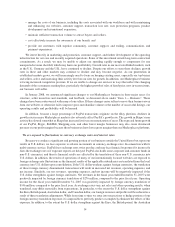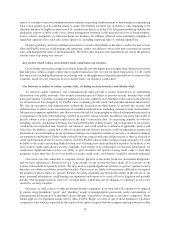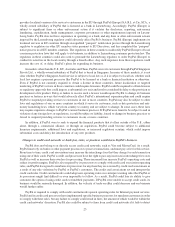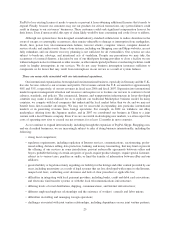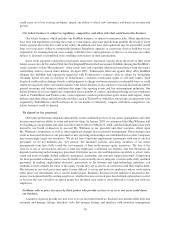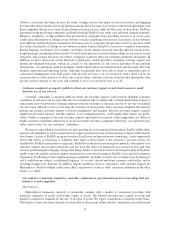eBay 2007 Annual Report Download - page 31
Download and view the complete annual report
Please find page 31 of the 2007 eBay annual report below. You can navigate through the pages in the report by either clicking on the pages listed below, or by using the keyword search tool below to find specific information within the annual report.other intellectual property issues, parallel imports and distribution controls, taxation, libel and defamation,
obscenity, and personal privacy apply to online businesses such as ours. The majority of these laws were adopted
prior to the advent of the Internet and related technologies and, as a result, do not contemplate or address the unique
issues of the Internet and related technologies. Those laws that do reference the Internet, such as the U.S. Digital
Millennium Copyright Act and the European Union’s Directive on Distance Selling and Electronic Commerce, are
being interpreted by the courts, but their applicability and scope remain uncertain. Furthermore, as our activities and
the types of goods and services listed on our websites expand, including through acquisitions such as our acquisition
of StubHub, an online ticket marketplace, in February 2007, regulatory agencies or courts may claim or hold that we
or our users are either subject to licensure or prohibited from conducting our business in their jurisdiction, either
with respect to our services in general, or with respect the sale of certain items, such as real estate, event tickets,
cultural goods, boats, and automobiles.
Our success and increased visibility has driven some existing businesses that perceive our business model to be
a threat to their business to raise concerns about our business models to policymakers and regulators, particularly in
the U.S. and Europe. These established businesses and their trade association groups employ significant resources
in their efforts to shape the legal and regulatory regimes in countries where we have significant operations. They
may employ these resources in an effort to change the legal and regulatory regimes in ways intended to reduce the
effectiveness of our businesses and the ability of users to use our products and services. In particular, these
established businesses have raised concerns relating to pricing, parallel imports, professional seller obligations,
stolen goods, copyrights, trademarks and other intellectual property rights, and the liability of the provider of an
Internet marketplace for the conduct of its users related to those and other issues. Success in changing the legal or
regulatory regimes in a manner that would increase our liability for third party listings could negatively impact our
business.
Over the last few years some large retailers and their trade associations have sought legislation in numerous
states and the U.S. Congress that would make eBay liable for the sale of stolen property or would ban certain
categories of goods from sale on our platform, including gift cards and health and beauty products. No such
legislation has passed. Nonetheless, the proponents continue to seek passage of such legislation, and if any of these
laws are adopted it could harm our business.
Numerous states and foreign jurisdictions, including the State of California, where our headquarters are
located, have regulations regarding “auctions” and the handling of property by “secondhand dealers” or “pawn-
brokers.” Several states and some foreign jurisdictions, including France, have attempted, and may attempt in the
future, to impose such regulations upon us or our users. Attempted enforcement of these laws against some of our
users appears to be increasing and such attempted enforcements could harm our business. In France, we have been
sued by Conseil des Ventes, the French auction regulatory authority. The agency alleges that sales on our French
website constitute illegal auctions which cannot be performed without their consent. This and other regulatory and
licensure claims could result in costly litigation or could require us to change the way we or our users do business in
ways that increase costs or reduce revenues or force us to prohibit listings of certain items for some locations. We
could also be subject to fines or other penalties, and any of these outcomes could harm our business.
A number of the lawsuits against us relating to trademark issues seek to have our websites subject to
unfavorable local laws. For example, “trademark exhaustion” principles provide trademark owners with certain
rights to control the sale of a branded product until it has been placed on the market by the trademark holder or with
the holder’s consent. The application of “trademark exhaustion” principles is largely unsettled outside of the EU,
and if trademark owners are able to force us to prohibit listings of certain items in one or more locations, our
business could be harmed.
As we expand and localize our international activities, we become obligated to comply with the laws of the
countries in which we operate. In addition, because our services are accessible worldwide, and we facilitate sales of
goods to users worldwide, one or more jurisdictions may claim that we or our users are required to comply with their
laws based on the location of our servers or one or more of our users, or the location of the product or service being
sold or provided in an ecommerce transaction. Laws regulating Internet and ecommerce companies outside of the
U.S. may be less favorable than those in the U.S., giving greater rights to consumers, content owners, competitors,
users and other third parties. Compliance may be more costly or may require us to change our business practices or
21





